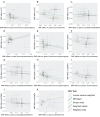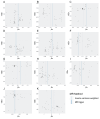Causal Relationship between Gut Microbiota and Endometrial Cancer: A Two-Sample Mendelian Randomization Study
- PMID: 40657402
- PMCID: PMC12244081
- DOI: 10.7150/ijms.112922
Causal Relationship between Gut Microbiota and Endometrial Cancer: A Two-Sample Mendelian Randomization Study
Abstract
Several relevant reports have shown that changes in the composition of the gut microbiota are related to the pathogenesis of endometrial cancer (EC). However, the causal effect of the gut microbiota on EC remains unknown. A two-sample Mendelian randomization (MR) study was used to assess the causal effects of the gut microbiota on EC, EC with endometrioid histologies and EC with non-endometrioid histologies. The genetic statistics of the gut microbiota, including 18,340 participants, were acquired from the MiBioGen database. The summary statistics of EC, EC with endometrioid histologies and EC with non-endometrioid histologies were obtained from the publicly available Genome-wide Association Study (GWAS) database. Suitable single nucleotide polymorphisms (SNPs) were selected as instrumental variables (IVs) (P < 5×10-8, r2 < 0.001). The causal effects were evaluated via the MR-Egger regression method, the inverse-variance weighted (IVW) method, the weighted median test, the weighted mode test, and the simple mode test. The IVW analysis suggested that Ruminococcusgnavusgroup (OR=0.82, 95%CI=0.78-0.85, P=1.29×10-17), Euryarchaeota (OR=0.90, 95%CI=0.87-0.94, P=3.78×10-6), and CandidatusSoleaferrea (OR=0.92, 95%CI=0.87-0.98, P=0.01) had protective effects on EC and its subtypes. Gammaproteobacteria (OR=1.29, 95%CI=1.19-1.39, P=2.32×10-10) served as a risk factor for EC, and Intestinimonas (OR=1.33, 95%CI=1.10-1.62, P=3.68×10-3) had detrimental effects on EC with non-endometrioid histologies. The causal relationship between the gut microbiota and EC was explored through two-sample MR analysis, which is helpful for further understanding the gut microbiota-mediated development mechanism underlying EC.
Keywords: Mendelian randomization; causality; endometrial cancer; genetics; gut microbiota.
© The author(s).
Conflict of interest statement
Competing Interests: The authors have declared that no competing interest exists.
Figures



References
-
- Crosbie EJ, Kitson SJ, McAlpine JN, Mukhopadhyay A, Powell ME, Singh N. Endometrial cancer. Lancet. 2022;399:1412–28. - PubMed
MeSH terms
LinkOut - more resources
Full Text Sources

